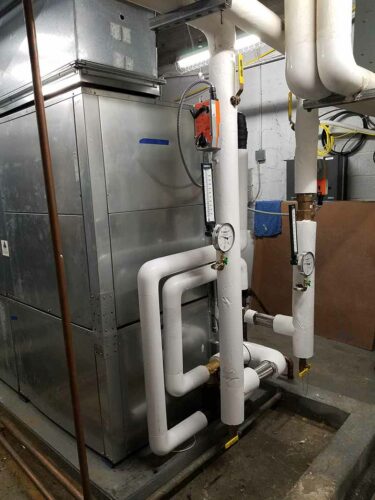With snow, sleet, hail, and rain pervading the wintertime, your HVAC system is susceptible to water damage. We’ve previously discussed external water damage on your system in a previous blog, but what about internal water damage? That usually stems from heat pump leaks. Here’s what you need to know in combating them.
What Causes Heat Pump Leaks?
Two of the most common causes of heat pump leaks are condensation and damaged parts. As your heat pump contains evaporator coils, it’s no doubt that moisture will soon follow. In fact, condensation and damaged parts go hand-in-hand.
Condensation is the result of moisture in the air, which can be caused by a number of factors:
- Evaporator coil damage: As evaporator coils carry refrigerant to absorb heat and cool air, it’s that same refrigerant that can lead to condensation. If refrigerant runs too low, ice can begin building up in your system and lead to excess condensation. Consider this alongside the cold weather that winter brings when combating heat pump leaks!
- Tubing issues: Heat pump leaks can also stem from condensate drain clogs and/or dirty coils.
If you think your heat pump might be leaking, it’s important to act quickly. In fact, all that water can be a breeding ground for mold and, in turn, Legionnaires’ disease. If you have noticed water stains on your ceiling or walls, or if there are signs of mold growth, it is time to call in an HVAC professional.
Combating Heat Pump Leaks

When it comes to combating heat pump leaks, there are a number of methods you can employ:
- Clean up any standing water: As soon as you notice your heat pump has a leak, use a towel or mop to soak up any standing water. This is a temporary solution, however, and doesn’t completely address the problem.
- Replace parts: Broken parts can play a major role in heat pump leaks. If any of these components have broken down, it is best to have them replaced immediately by a professional HVAC technician in order to avoid damage or injury from leaking carbon monoxide fumes.
You may be surprised to learn that a leaking heat pump can lead to expensive water damage, mold growth, and even a fire risk. Furthermore, leaky coils will cause your system to work harder than it needs to, which means higher energy bills and increased wear on the equipment.
This is why it’s always a good idea to consult an HVAC professional if you are unsure whether or not you have a leaky heat pump; they can assess the situation and recommend action steps accordingly.
Combating Heat Pump Leaks with Donnelly Mechanical
With Donnelly’s decades of experience, our trained technicians are ready, willing and able to tackle any heat pump leaks you may have this winter. To learn more about our offerings and how we can help, please visit our website and get in touch with us today!